Is it enough to simply feed your engine with the right fuel and quality marine grade oil, or should boat owners and their professional advisors do more protect this expensive investment? We spoke with David Kaiser, Head of Research and Development at LIQUI MOLY, to learn about the important role of engine additives and why it makes sense to both stock and use them.
A key reason to use additives is to make your whole engine system more reliable. This is important for any boat used at sea particularly. Using them can help you avoid problems that might cause unreliability or even an expensive repair. David explains it’s like having an insurance policy where you pay a small amount of money to avoid a big bill in case of an incident.
Here we look at LIQUI MOLY’S dedicated marine additives, developed by the company’s own highly experienced team of researchers at their R&D facility in Ulm, Germany. We consider their application and see why they make a great addition to any chandler’s shelf or engineer’s recommended service items for leisure boat owners around the globe.
Protecting against diesel bug
These days it is becoming common practice to guard against the formation of bacteria in diesel and all the resultant damage and unreliability that can cause. The frequency of contamination appears to be on the rise and that trend is likely to continue now that biodiesel is often blended into the marine diesel dispensed in many parts of the world.
Biodiesel is an ester that comes from nature and is particularly sensitive to microbiological decay. Bacteria can use biodiesel as a source of energy and if they have that and water, then they can thrive in your tank. The water usually comes from condensation that forms on exposed internal surfaces of tanks, promoted by large temperature differentials between night and day. When it gets cold, damp air is pulled into the tank from the outside.
Just 100ml-200ml of water is sufficient for the bacteria to grow and as they do that they also then die, forming a heavy sludge which blocks filters, gets into the fuel pump. They might even block injectors and cause corrosion because byproducts of bacteria digestion are acidic; they also reduce the quality of the fuel.
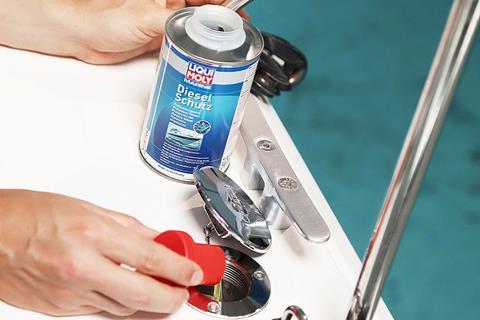
LIQUI MOLY’s Marine Diesel Protect is a very effective biocide that prevents this germ growth and all its nasty side effects. When used as a regular preventative treatment the dosage is 1:1000 – so a 500ml container will treat 500lt of fuel, or 1lt container 1000lt. The cost uplift ratio of a regular preventative dose will vary according to local marine diesel prices, but as an indicator it will increase fuelling costs to the end user of a leisure boat by around 2%-2.5%.
A booster dose of 1:200 is recommended for systems that are already contaminated. If bacterial sludge is already present in large qualities, then that can require expensive cleaning of the whole fuel system and potentially repairs to the sensitive components of the engine, a good reason to consider regular preventative treatment.
One important benefit of choosing Marine Diesel Protect over many other products in the market is that it has been independently scientifically tested. LIQUI MOLY worked with an official microbiological laboratory in Germany to prove compliance with ASTM specifications for fuel preservatives.
“To ensure compliance, defined types and amounts of germs are added to the fuel, then tests are run at defined time intervals out to 28 days,” explains David Kaiser, Head of Research and Development at LIQUI MOLY. “By seven days there were no more germs left in the tests that were run on Marine Diesel Protect. It’s an important aspect of LIQUI MOLY’s products that we validate the quality of our products – whenever you see our logo on a container, it is proof of the effectiveness of the contents and an indication they have passed a very high graduation point before being launched onto the market. All the promises we make in the product information are guaranteed by us.”
That proven effectiveness of Marine Diesel Protect is also available directly for sale to boat users themselves, unlike some of the most effective alternate products which use formaldehyde releasers. Formaldehyde is a carcinogen, which restricts the use of these alternate products to professional application.
Improving diesel efficiency and reducing emissions
It’s one thing to ensure that diesel marine propulsion systems run reliably on bacteria free fuel, but can you improve their efficiency and reduce emissions? That’s the purpose of LIQUI MOLY’s Marine Super Diesel Additive, which cleans the injectors, improves lubricity, and enhances the cetane number of the fuel to lower emissions and reduce engine knocking when running. That’s not only good for the environment but also for the crew because clean injectors and a high cetane number should also lead to less exhaust smell and a reduction in black smoke.
Super Diesel Additive includes a very strong corrosion protection package, which makes it suitable as a winterisation treatment also if you haven’t dosed your fuel with Marine Diesel Protect. As we were reminded when looking at LIQUI MOLY’s engine oils, protecting engines in the often harsh marine environment is essential for their health.
Protecting gasoline engines
For gasoline, bacteria protection is unnecessary, as gasoline is a biocide by itself, especially in some cases when it contains ethanol. But you do need two alternate additives to preserve and improve two- and four-stroke petrol engines and LIQUI MOLY has proven solutions for both requirements.
The first is a stabiliser, which prevents oxidation of the fuel and contains strong corrosion protection. That is particularly useful when winterising a boat because you may be leaving the unused fuel for more than half a year. Modern fuels are more sensitive to oxidation than older fuels. Oxidised fuel always causes deposits in the fuel system that raise the fuel consumption, worsen exhaust gases and lead to malfunctions of the engine. For example, if the injectors are blocked, you have higher fuel consumption, and the engine may not run well. And this prevents oxidation and corrosion.
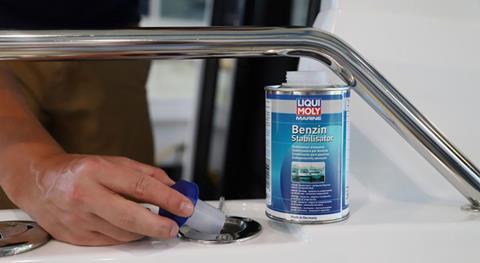
LIQUI MOLY’S Marine Fuel Stabiliser is supplied in 500ml containers to treat 100l of gasoline. It can be used over the winter and for long-term use in seldom-used engines.
The second recommended additive is a fuel system cleaner, to remove deposits on injection valves, intake valves, spark plugs and combustion chambers. This results in improved engine running, fuel savings, reduced emissions and better reliability for start-up.
LIQUI MOLY’S Marine Fuel System Cleaner is supplied in 500ml containers to treat 250l of gasoline. In addition to the benefits of its engine cleaning properties, it also contains corrosion protection additives to preserve the life of outboards and inboard petrol engines.
Further options
In addition to its marine dedicated range, LIQUI MOLY also has suitable additives within its automotive portfolio that work well in boat applications to enhance marine lubricants. An example is Cera Tec wear protection, designed to be added to the lubricating oil of gasoline and diesel engines, manual transmissions, pumps and compressors. It uses ceramic compounds to prevent direct metal to metal contact and reduce friction for less wear and greater engine efficiency.
Another is LIQUI MOLY’s MoS2 lubrication enhancer which forms a high-load lubricating film on all rubbing and sliding metal surfaces. This not only also boosts efficiency but provides emergency running properties in case of oil loss. Boats in the US Mercury racing series have utilised both products and found they also help to maintain lower oil temperature when working at high power.
Further information
To read more about LIQUI MOLY’s dedicated range of marine lubricants and additives, please visit www.liqui-moly.com/en/products/areas-of-use/marine.htm








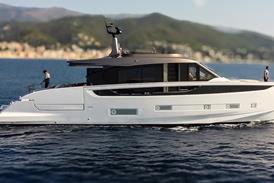

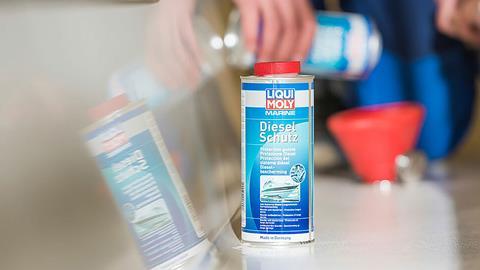
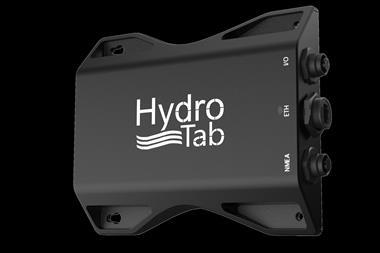
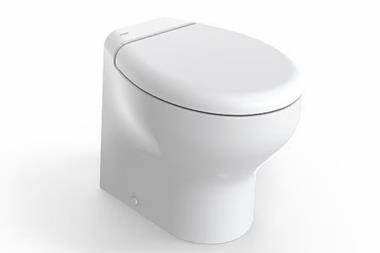
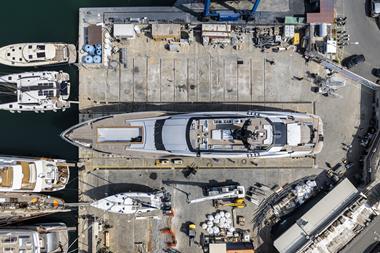

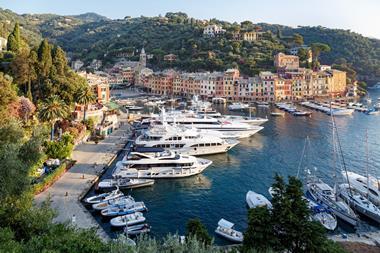



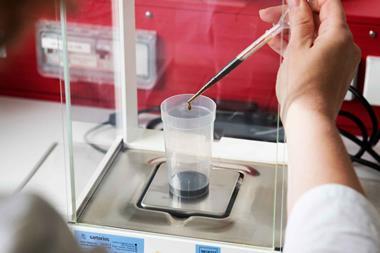
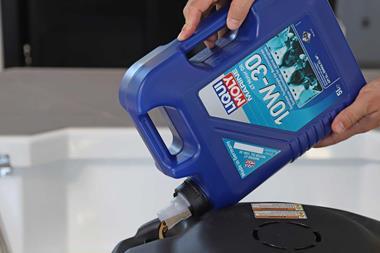


 LinkedIn
LinkedIn X / Twitter
X / Twitter Facebook
Facebook Email us
Email us




